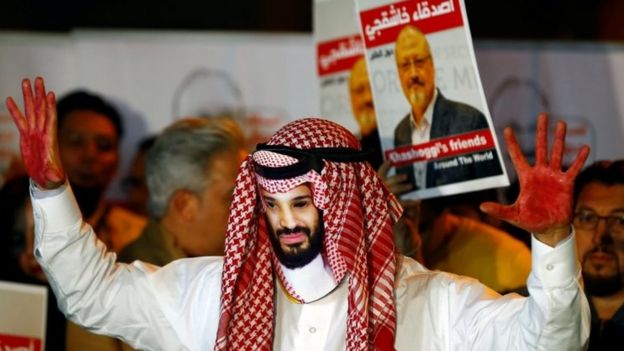The US senator says Congress will reintroduce sanctions against those involved in the killing of Jamal Khashoggi.
Senator Lindsey Graham has said the relationship between the United States and Saudi Arabia cannot move forward until Crown Prince Mohammed bin Salman (MBS) is "dealt with".
Speaking in Ankara a day after meeting with Turkish President Recep Tayyip Erdogan, Graham said Congress would reintroduce sanctions against those involved in the killing of Saudi writer Jamal Khashoggi.
"What has transpired over the last couple of years has been unnerving, to say the least," Graham told reporters.
"The leadership coming from MBS is not what I have envisioned. Imprisoning the Lebanese Prime Minister, taking all of your critics and throw[ing] them in prison, the brutal murder [of] Mr Khashoggi in Turkey, violating every norm of international behaviour.
"I have concluded that the relationship between Saudi Arabia and the United States cannot move forward until MBS has been dealt with."
Last November, the CIA concluded that MBS ordered the assassination of Khashoggi in Istanbul, a finding that contradicts Saudi government assertions that he was not involved.Khashoggi, a longtime royal insider who had become a critic of Prince Mohammed, was killed and dismembered by a Saudi hit team in the kingdom's consulate in Istanbul in October, prompting a global outcry.
"We will start sanctioning those involved in the killing of Mr Khashoggi," Graham added.
"We will make a definitive statement that MBS knew about it and is responsible for it and come up with a series of sanctions to let others know this is not what you do if you're an ally of the United States."
'Not one to mince his words'
The US Treasury sanctioned 17 Saudi individuals and the Senate adopted a resolution blaming Prince Mohammed. President Donald Trump, however, has so far been reluctant to directly implicate the royal or issue any punitive measures.
At least 21 Saudis have reportedly been arrested in connection with the case, with five facing the death penalty. Five officials were also fired, including senior royal adviser Saud al-Qahtani, the alleged mastermind of the operation against Khashoggi.
Saudi Arabia is yet to reveal what its agents did with the remains of Khashoggi.
Al Jazeera's Osama Bin Javaid, reporting from the Turkish city of Gaziantep, said Graham's comments were not surprising considering his recent distaste for the Saudi Monarch.
"Graham is not one to mince his words and has called MBS a wrecking ball in the past. So, this is not the first time he's airing his views about MBS and how he feels he's implicated in Khashoggi's murder.
"He's based that on information provided by the CIA that orders did not come from a low-level operative but straight from the top, almost indicting the Saudi leadership, including MBS.
"But the US president still sees MBS as a key ally, and sees Saudi Arabia's role as not just buying weapons from the US, but also in forwarding what Donald Trump has envisioned as a policy for the Middle East," Bin Javaid said.
"So it's very interesting that Graham's stance is closer to the US ally Turkey but very different from what the president himself has been saying."
'Filling a void'
Andreas Krieg, an assistant professor at the Defence Studies Department of King's College London, said Graham was filling a much needed void in US foreign policy.
"[John] Bolton was trying to reach out to Turkey as a national security adviser but was given a bit of a slap by Erdogan because he doesn't trust him. Bolton has been very hawkish in his approach to Turkey and in general, Islamism in the region.
"Then you have [Mike] Pompeo who has been in the region recently but has been very pro-Saudi and hasn't responded well to the pressure in civil society and the media in the US over the Khashoggi affair.
"And then you had [Jim] Mattis, who while being diplomatic was let go recently. So there's a void Graham is filling given he's a very prominent foreign policy expert in congress".
Al Jazeera's Gabriel Elizondo, reporting from Washington DC, said while it was surprising Graham had visited Turkey amid the government shutdown, he couldn't have gone "without some sort of coordination with the White House".
Trump has refused to approve legislation to restore funding to about a quarter of the federal government, resulting in up to 800,000 employees going without pay.
And earlier this week, House Speaker Nancy Pelosi was forced to abandon a planned trip to Afghanistan after Trump denied her the use of military aircraft.
"Considering how close Graham is with Trump, there's no way he could have gone to Turkey without some sort of coordination with the White House," Elizondo said.
"How much coordination, and how much he is speaking on behalf of the administration, remains to be seen. But Graham doesn't need President Trump's blessing to go anywhere. He can speak about anything. Graham is one of America's most powerful senators. He sits on the Foreign Relations committee, the Budget committee, the Appropriations committee.
"For several years now he's been a strong voice in international relations ... and this is the second time he's met with President Erdogan in the past six months".
Syria withdrawal
Senator Graham also said he hoped President Trump would slow the US withdrawal from
Syria until
the Islamic State of Iraq and the Levant (ISIL, also known as ISIS) is destroyed.
Graham said he believed US Chief of Staff Joseph Dunford was working on a plan with
Turkey to move Kurdish YPG elements away from the country.
By arming the YPG group in Syria, Washington "created a nightmare for Turkey," said Graham.
Underlining that the YPG/PYD is "clearly" tied to the PKK - listed as a terrorist group by Turkey, the US, and the European Union - Graham told reporters that the US strategy in Syria has the potential to cause harm to Turkey.
The South Carolina senator stressed the importance of protecting Turkey and solving the problem the US "created" for Ankara, referring to US support for the YPG/PYD in the name of fighting ISIL.
Turkey has said it will soon launch an operation against the YPG/PYD in Syria, east of the Euphrates River, near the Turkish border.
There has been friction between Ankara and Washington over the upcoming operation amid the withdrawal of US forces from Syria.




